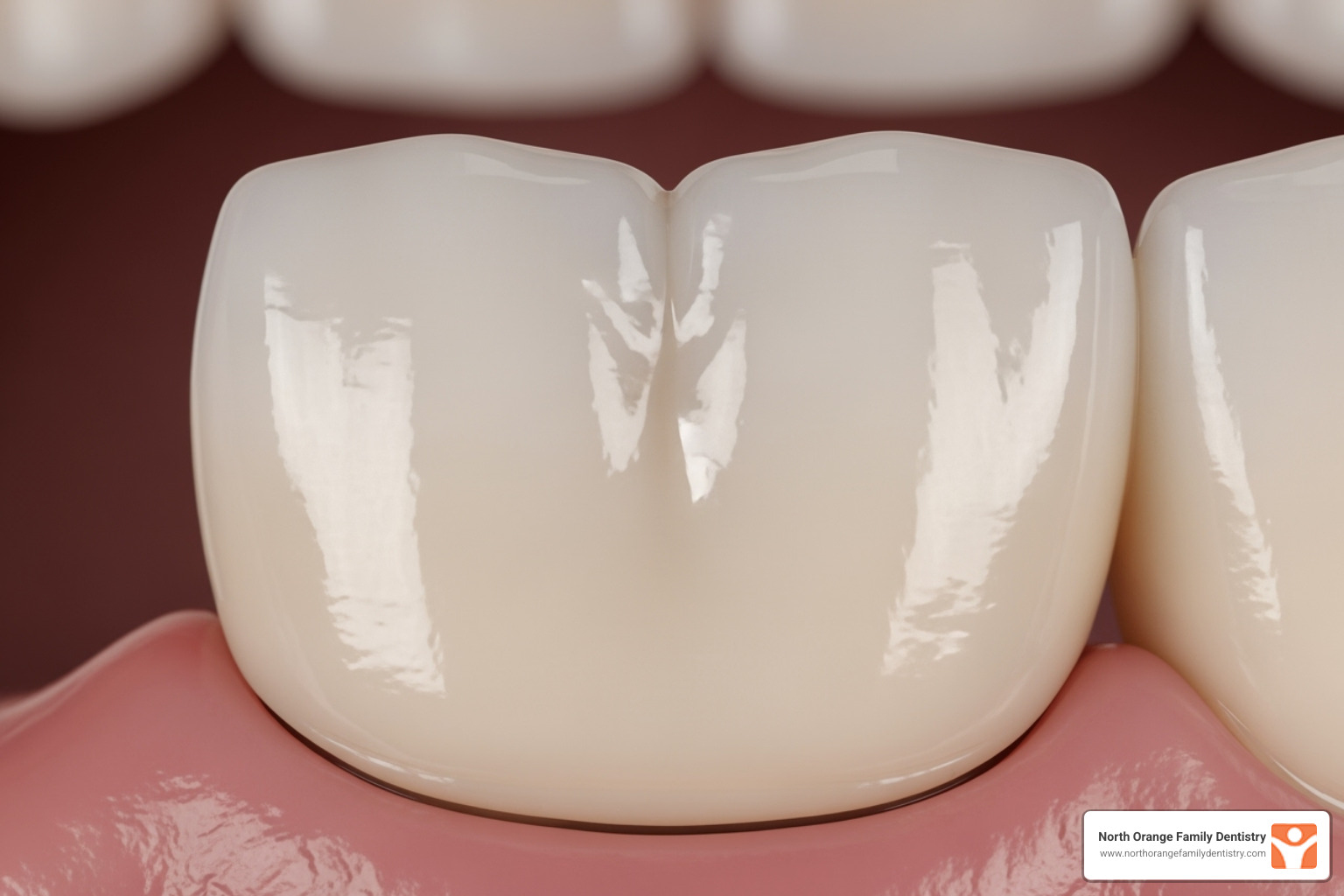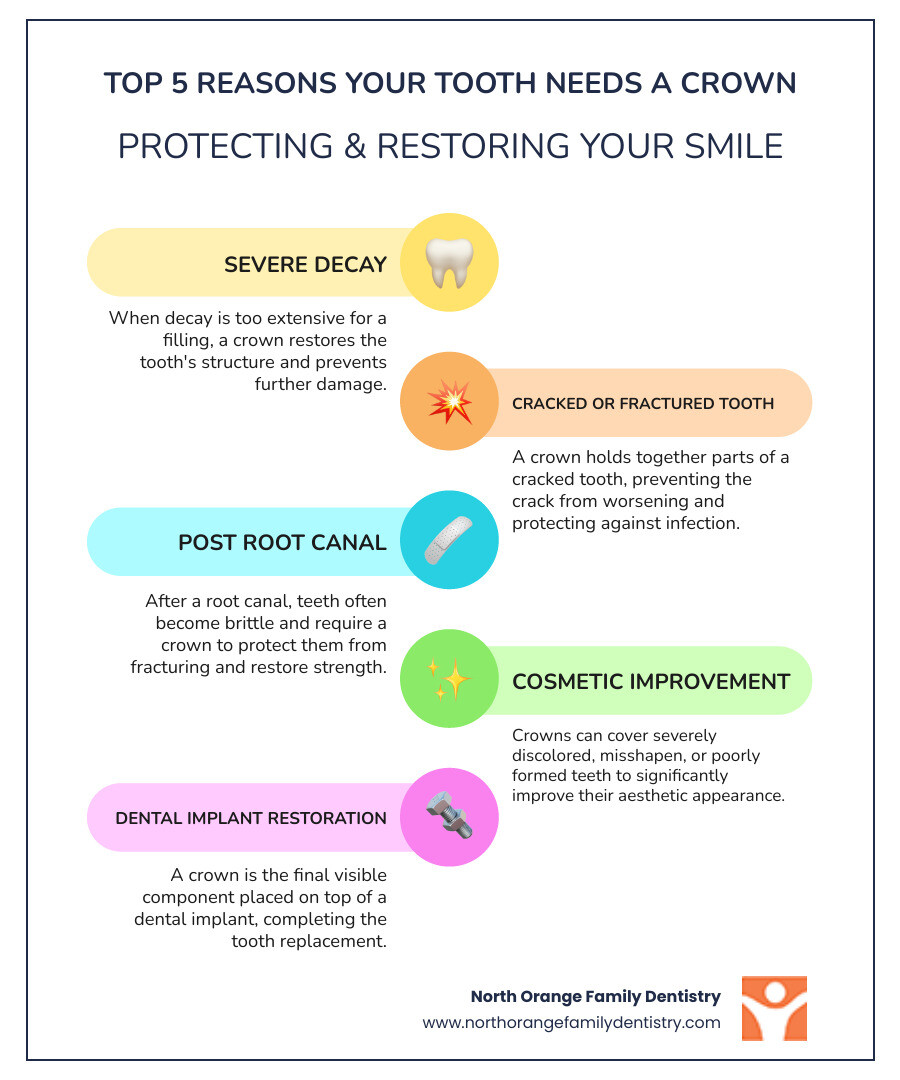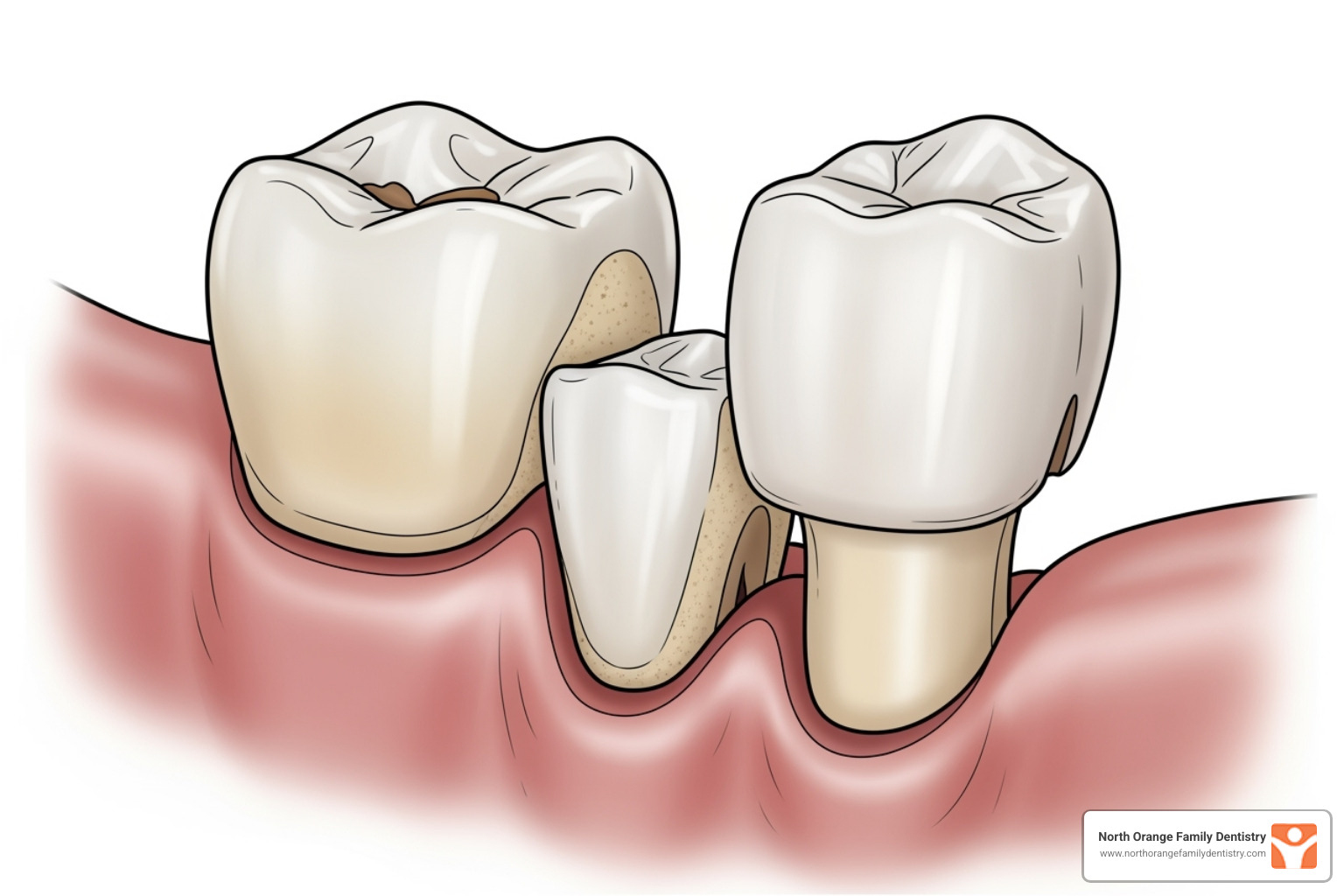
Uncapping Savings: Affordable Dental Crowns Explained
Need an affordable tooth crown? Our guide explains materials, costs, process, and care to restore your smile on a budget. Get confident!


Restoring Your Smile Without Breaking the Bank
An affordable tooth crown can restore your damaged tooth's strength and beauty without emptying your wallet. Here are your key options for getting quality dental crowns at a reasonable cost:
- Porcelain-fused-to-metal crowns - Balance durability with natural appearance
- Dental insurance coverage - Often covers 50-80% of medically necessary crowns
- Dental wellness plans - Discounted care for families without insurance
- Same-day crowns - Eliminate multiple visits and temporary crown costs
- Compare materials - Metal crowns cost less than all-ceramic options
When you have a damaged, cracked, or severely decayed tooth, a dental crown acts like a protective cap that covers the entire visible portion of your tooth. This tooth-shaped restoration not only strengthens weakened teeth but also improves their appearance and function.
The good news? You don't have to sacrifice quality for affordability. Modern dental technology and flexible payment options make it possible to get the crown you need without breaking your budget.
Many patients worry about the high cost of dental work, and rightfully so. However, with the right approach and understanding of your options, getting an affordable tooth crown is absolutely achievable. The key is knowing what factors influence cost and which solutions work best for your specific situation.
I'm Dr. Kyle Bogan, a Fellow of the Academy of General Dentistry, and I've helped countless families in the Lewis Center and Delaware areas access quality dental care through our affordable tooth crown solutions and dental wellness plans. My goal is to ensure every patient receives excellent care regardless of their insurance status.

Your Guide to Getting an Affordable Tooth Crown
What are Dental Crowns and Why Do You Need One?
A dental crown, often referred to as a "dental cap," is a custom-made restoration that covers the entire visible part of a damaged tooth. Think of it as a snug, tooth-shaped helmet designed to protect and restore your natural tooth. Its primary purpose is to restore a tooth's normal size, shape, and function, while also enhancing its appearance.
We recommend dental crowns for a variety of reasons:
- Severe Decay: When a cavity is too large for a traditional filling to repair effectively, a crown can save the tooth from further damage and potential extraction.
- Cracked or Broken Tooth: A crown can hold together a badly damaged tooth, preventing further breakage and strengthening its structure. Studies show that teeth restored with preformed crowns are less likely to develop problems or cause pain in the long term compared to fillings.
- After a Root Canal: Following a root canal procedure, the tooth can become brittle and prone to fracture. A crown provides essential protection, reinforcing the tooth and preventing it from splitting.
- Topping a Dental Implant: When we place a dental implant to replace a missing tooth, a crown is the final restoration that attaches to the implant, giving you a functional and natural-looking replacement tooth. For a single tooth, the average cost of a dental implant and crown at our practice is about $4500.
- Large Fillings: Teeth with extensive fillings and minimal natural tooth structure often benefit from a crown to prevent the remaining tooth from weakening or breaking.
- Cosmetic Improvement: Crowns can also be used as a cosmetic solution to cover severely discolored, misshapen, or worn-down teeth, significantly improving your smile's aesthetics.
The benefits of choosing a dental crown are clear: they restore function, allowing you to chew and speak comfortably; they improve aesthetics, giving you the confidence to smile without hesitation; and most importantly, they protect your natural tooth from further damage, potentially saving it from extraction. Studies, including a comprehensive analysis of over 1,000 single crowns, show that crowns offer a high cumulative survival rate of 89.9% after 5 years and 80.9% after 10 years, with many lasting well beyond that timeframe.

Comparing Crown Materials and Their Costs
The cost of a dental crown is influenced by several factors, including the material chosen, the complexity of the procedure, and even the geographic location where you receive treatment. Understanding the different materials available is key to finding an affordable tooth crown that meets your needs.
Here's a comparison of common dental crown materials:
| Material | Pros | Cons | Best use |
|---|---|---|---|
| Porcelain-fused-to-metal (PFM) | Durable metal core with a natural-looking porcelain exterior; often more budget-friendly than all-ceramic | A dark line at the gumline may show over time; porcelain can chip | Back teeth where strength matters |
| All-ceramic / All-porcelain | Highly aesthetic and translucent; metal-free and biocompatible | Less fracture-resistant on heavy-biting molars than PFM/zirconia | Front teeth where appearance is critical |
| Zirconia | Extremely strong and durable; tooth-colored and biocompatible | Hardness can wear opposing teeth; more difficult to adjust | Molars and patients who grind their teeth |
| Metal alloys (e.g., gold) | Exceptionally durable; gentle on opposing teeth; requires less tooth removal | Metallic color is not ideal for visible teeth | Out-of-sight molars and patients prioritizing longevity |
Key factors that influence your total crown cost and value:
- Material choice: Metal alloys are often the most economical; all-ceramic and zirconia typically cost more.
- Technology used: Same-day CAD/CAM crowns can reduce the number of visits and eliminate temporary crown costs.
- Geographic location and dental lab fees.
- Any needed preparatory care: Core build-ups, gum therapy, or root canal treatment can affect your overall treatment plan.
- Insurance and membership savings: Many insurance plans cover 50–80% of medically necessary crowns. If you don’t have insurance, our North Orange Dental Wellness Plan helps individuals and families access their yearly preventive care at a discounted price, keeping long-term crown costs more predictable.
For more details about how crowns are planned and placed at our practice, see our resource: More info about dental crowns.
Restoring Your Smile Without Breaking the Bank
An affordable tooth crown can restore your damaged tooth's strength and beauty without emptying your wallet. Here are your key options for getting quality dental crowns at a reasonable cost:
- Porcelain-fused-to-metal crowns - Balance durability with natural appearance
- Dental insurance coverage - Often covers 50-80% of medically necessary crowns
- Dental wellness plans - Discounted care for families without insurance
- Same-day crowns - Eliminate multiple visits and temporary crown costs
- Compare materials - Metal crowns cost less than all-ceramic options
When you have a damaged, cracked, or severely decayed tooth, a dental crown acts like a protective cap that covers the entire visible portion of your tooth. This tooth-shaped restoration not only strengthens weakened teeth but also improves their appearance and function.
The good news? You don't have to sacrifice quality for affordability. Modern dental technology and flexible payment options make it possible to get the crown you need without breaking your budget.
Many patients worry about the high cost of dental work, and rightfully so. However, with the right approach and understanding of your options, getting an affordable tooth crown is absolutely achievable. The key is knowing what factors influence cost and which solutions work best for your specific situation.
I'm Dr. Kyle Bogan, a Fellow of the Academy of General Dentistry, and I've helped countless families in the Lewis Center and Delaware areas access quality dental care through our affordable tooth crown solutions and dental wellness plans. My goal is to ensure every patient receives excellent care regardless of their insurance status.

Your Guide to Getting an Affordable Tooth Crown
What are Dental Crowns and Why Do You Need One?
A dental crown, often referred to as a "dental cap," is a custom-made restoration that covers the entire visible part of a damaged tooth. Think of it as a snug, tooth-shaped helmet designed to protect and restore your natural tooth. Its primary purpose is to restore a tooth's normal size, shape, and function, while also enhancing its appearance.
We recommend dental crowns for a variety of reasons:
- Severe Decay: When a cavity is too large for a traditional filling to repair effectively, a crown can save the tooth from further damage and potential extraction.
- Cracked or Broken Tooth: A crown can hold together a badly damaged tooth, preventing further breakage and strengthening its structure. Studies show that teeth restored with preformed crowns are less likely to develop problems or cause pain in the long term compared to fillings.
- After a Root Canal: Following a root canal procedure, the tooth can become brittle and prone to fracture. A crown provides essential protection, reinforcing the tooth and preventing it from splitting.
- Topping a Dental Implant: When we place a dental implant to replace a missing tooth, a crown is the final restoration that attaches to the implant, giving you a functional and natural-looking replacement tooth. For a single tooth, the average cost of a dental implant and crown at our practice is about $4500.
- Large Fillings: Teeth with extensive fillings and minimal natural tooth structure often benefit from a crown to prevent the remaining tooth from weakening or breaking.
- Cosmetic Improvement: Crowns can also be used as a cosmetic solution to cover severely discolored, misshapen, or worn-down teeth, significantly improving your smile's aesthetics.
The benefits of choosing a dental crown are clear: they restore function, allowing you to chew and speak comfortably; they improve aesthetics, giving you the confidence to smile without hesitation; and most importantly, they protect your natural tooth from further damage, potentially saving it from extraction. Studies, including a comprehensive analysis of over 1,000 single crowns, show that crowns offer a high cumulative survival rate of 89.9% after 5 years and 80.9% after 10 years, with many lasting well beyond that timeframe.

Comparing Crown Materials and Their Costs
The cost of a dental crown is influenced by several factors, including the material chosen, the complexity of the procedure, and even the geographic location where you receive treatment. Understanding the different materials available is key to finding an affordable tooth crown that meets your needs.
Here's a comparison of common dental crown materials:
| Material | Pros | Cons | Best use |
|---|---|---|---|
| Porcelain-fused-to-metal (PFM) | Durable metal core with a natural-looking porcelain exterior; often more budget-friendly than all-ceramic | A dark line at the gumline may show over time; porcelain can chip | Back teeth where strength matters |
| All-ceramic / All-porcelain | Highly aesthetic and translucent; metal-free and biocompatible | Less fracture-resistant on heavy-biting molars than PFM/zirconia | Front teeth where appearance is critical |
| Zirconia | Extremely strong and durable; tooth-colored and biocompatible | Hardness can wear opposing teeth; more difficult to adjust | Molars and patients who grind their teeth |
| Metal alloys (e.g., gold) | Exceptionally durable; gentle on opposing teeth; requires less tooth removal | Metallic color is not ideal for visible teeth | Out-of-sight molars and patients prioritizing longevity |
Key factors that influence your total crown cost and value:
- Material choice: Metal alloys are often the most economical; all-ceramic and zirconia typically cost more.
- Technology used: Same-day CAD/CAM crowns can reduce the number of visits and eliminate temporary crown costs.
- Geographic location and dental lab fees.
- Any needed preparatory care: Core build-ups, gum therapy, or root canal treatment can affect your overall treatment plan.
- Insurance and membership savings: Many insurance plans cover 50–80% of medically necessary crowns. If you don’t have insurance, our North Orange Dental Wellness Plan helps individuals and families access their yearly preventive care at a discounted price, keeping long-term crown costs more predictable.
For more details about how crowns are planned and placed at our practice, see our resource: More info about dental crowns.

Contact Us
Have any questions? Want to learn more?


